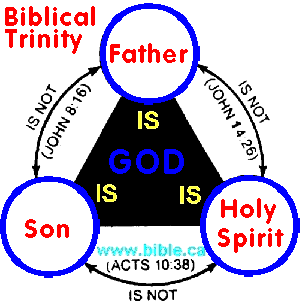The conflict between those who believe Jesus is God and those who don't came into play in early part of the 4th century C.E., coming to a head at the Council of Nicaea in 325 C.E. and in which Roman Emperor Constantine presided over and of which an Alexandrian (of Egypt) priest named Arius (250-336 C.E., who taught that Jesus was not God and was rejected at the Council) was in a battle with another Alexandrian priest named Athanasius (who believed that Jesus is God, yet never wrote the Athanasian Creed) over the issue of who Jesus is.
The distortion about who Jesus Christ is, was actually started long before this, for shortly before his death, the apostle John said in about 98 C.E.: "Young children, it is the last hour (before the foretold apostasy or "falling away" of Christianity; Matt 13:24-30, 36-43; 2 Thess 2:3-6), and just as you have heard that the antichrist (meaning "against (or instead of ) Christ", a false religious movement (especially Christendom) that eventually overwhelms true Christianity, supplanting it after the death of the apostles, assuming its role though counterfeit) is coming, even now many antichrists have appeared, from which fact we know that it is the last hour (just before true Christianity ["wheat"] is overtaken by "weeds" or imitation Christians, Matt 13:25, 26)".(1 John 2:18)
"They went out from us, but they were not of our sort (rejecting the channel for accurately understanding God's word, that Jesus had established in the 1st century, the apostles and later "the faithful and discreet slave" in our time frame, Matt 24:45-47), for if they had been of our sort, they would have remained with us. But they went out (teaching distortions and lies about God and Jesus as well as the rest of the Bible, 1 Tim 4:1-3) so that it might be shown that not all are of our sort.......Who is the liar but the one who denies that Jesus is the Christ (or "anointed one of God", not God) ? This is the antichrist, the one who denies the Father and the Son (as separate and distinct, with the Son inferior to the Father, John 14:28; Matt 24:36 and in which there is no mention of the holy spirit)".(1 John 2:19, 22)
John writes within this same letter, that "no one (or human) has seen God at any time".(1 John 4:12) He also put these same words within his gospel of John at John 1:18, saying: "No man has seen God at any time; the only-begotten god who is at the Father's side is the one who has explained him". Hence, Jesus is a god, but not the Almighty God.
Many take issue with this, accepting the Trinitarian view, but these fail to properly see and reason on the Bible. They often use John 1:1 that says according to many Bibles: "In the beginning was the Word, and the Word was with God, and the Word was God".(King James Bible)
Is this accurate ? No. How can this be known ? For one, Koine (or common) Greek in the 1st century did not have an indefinite article such as "a", but did have a definite article such as "the". So if a person wanted to express something as indefinite, it was not really possible. If they wanted to say "a house" instead of "the house", it had to understood that was what they were saying by the receiving party.
For example, the King James Bible says "a house" at Mark 3:25. It is understood to mean this, despite there is no indefinite article. So the translators took the liberty to insert the indefinite article "a" in this Scripture, because the context said to do so.
Thence, at John 1:1, there is no indefinite article that can assist a person reading it to grasp that Jesus is "a god". But it is of real interest that John uses the definite article "the" before "Word" (or "the Word") both times and once as "the God", but not when expressing who "the Word" is, allowing the reader to understand that "the Word" is indefinite or "a god" and not "the God".
There has been found an ancient manuscript of Sahidic Coptic (spoken in Egypt in centuries immediately following Jesus death), a language that has an indefinite article ("a") and of which John 1:1 was translated from Greek. The Anchor Bible Dictionary says of Sahidic Coptic: "Since the [Greek Septuagint] and the [Christian Greek Scriptures or New Testament] were being translated into Coptic during the 3rd century C.E., the Coptic version is based on [Greek manuscripts] which are significantly older than the vast majority of extant (or existing) witnesses".
The Sahidic Coptic rendering of John 1:1 reads: "in the beginning existed the Word and the Word existed with the God and a god was the Word".(Chester Beatty manuscript 813, located in Dublin, Ireland) For more on Jesus not being God, please consider Matt 3:17, 1 Corinthians 8:6, John 7:17, John 8:29, 30, Hebrews 5:7-10, Revelation 1:1, Revelation 3:14, to name just a few.



